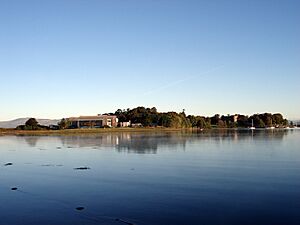Scottish Association for Marine Science facts for kids
|
SAMS
|
|
 |
|
| Type | Research institute University |
|---|---|
| Established | 1884 |
|
Academic staff
|
55 |
|
Administrative staff
|
110 |
| Students | 190 |
| Undergraduates | 110 |
| Postgraduates | 50 |
| 30 | |
| Location | , |
| Campus | Dunbeg |
| Director | Prof NJP Owens |
| Affiliations | UHI UNU NERC MASTS |
The Scottish Association for Marine Science (SAMS) is the oldest charity in the United Kingdom for ocean research and learning. It was started way back in 1884. Today, it is located near the town of Oban in Argyll, Scotland.
SAMS is a key partner of the University of the Highlands and Islands. This means students can study there to earn degrees about the ocean and its environment. It is also connected with the United Nations University, showing its global importance.
Contents
The History of SAMS
The story of SAMS began in 1884 with Sir John Murray, a famous ocean explorer. After a major sea journey called the Challenger expedition, he founded the Scottish Marine Station. Its first home was in Granton, near Edinburgh.
The station grew quickly. Over the next ten years, it moved to the Isle of Cumbrae on Scotland's west coast. A new building was built there in 1897. In 1914, the group officially became the Scottish Marine Biological Association.
After studying the sea around the island for 80 years, the association moved. In 1967, it built new labs near Oban. This location is great because it's close to many different types of ocean environments. The group changed its name to the Scottish Association for Marine Science in 1992.
The labs were updated in 2004 with new equipment. In 2010, new buildings for teaching students were added. SAMS also has a visitor attraction called the Ocean Explorer Centre, where people can learn about the ocean and the cool research happening at SAMS.
What Do Scientists at SAMS Research?
Scientists at SAMS study the ocean in three main ways:
- Discovering Ocean Processes: They explore the physics, chemistry, geology, and biology of the sea. This helps us understand how the ocean works.
- Protecting the Coast: They study how human actions affect the coast. This includes things like climate change, pollution, and taking too many resources from the sea. They work with communities to find solutions.
- Creating a Sustainable Blue Economy: They look for ways people can use the ocean for jobs and resources without harming it. This is often called the "blue economy."
To do this work, SAMS has a team of experts. They have physicists, biologists, chemists, computer scientists, and many others working together.
Important Discoveries
SAMS scientists research many topics, including climate change, renewable energy from the ocean, and the Arctic.
In 2024, a team led by Professor Andrew Sweetman from SAMS made a big discovery. They found the first proof that oxygen can be produced in the deep sea without any light. This process is called dark oxygen production.
Helping Businesses and Industry
SAMS uses its knowledge to help businesses in a smart and safe way. In 2002, it created SAMS Enterprise. This part of SAMS offers expert advice and services to industries like:
- Fish farming (aquaculture)
- Renewable energy (like wind and wave power)
- Seafood safety
- Seaweed farming
They also create special tools. One tool can measure snow and ice in very cold and remote places. Another is a computer program that predicts the impact of fish farms on the seabed.
Special Tools and Facilities
SAMS has amazing facilities to help with its research.
Ocean Robots
SAMS uses many types of robots, including flying drones, surface boats, and underwater submarines. These robots help with projects like mapping the seafloor and studying deep water. They can go to places that are difficult or dangerous for humans to reach.
Algae and Protozoa Collection
SAMS is home to the Culture Collection of Algae and Protozoa (CCAP). It is the biggest collection of tiny ocean life like algae and protists in Europe. These tiny organisms are very important for ocean health. The collection helps scientists study them, for example, to understand diseases that affect algae.
Learning at SAMS
SAMS is also a place for education. It offers many university courses for students who want to become marine scientists. Some of the degrees available are:
- Marine Science
- Marine Science with Marine Biology
- Marine Science with Arctic Studies
- Marine Science with Oceanography & Marine Robotics
- Aquaculture, Environment and Society
Students can earn bachelor's, master's, and even doctorate (PhD) degrees at SAMS.
 | John T. Biggers |
 | Thomas Blackshear |
 | Mark Bradford |
 | Beverly Buchanan |


